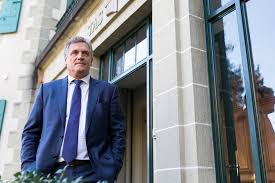By Andrew Warshaw and Paul Nicholson
September 25 – The Court of Arbitration for Sport (CAS) has issued a stunning indictment of the conduct of former FIFA secretary-general Jerome Valcke in issuing its full written reasons for dismissing his appeal against a 10-year ban from football and a CHF100,000 fine.
Two months after throwing out Valcke’s appeal, CAS has published its so-called written judgement stretching to 76 pages, laying bare how FIFA operated under its former number two.
Valcke, for years FIFA’s charismatic go-to troubleshooter before being snared by ethics prosecutors, was number two to Sepp Blatter for eight years. He was fired in January 2016 over the sale of World Cup tickets, abuse of travel expenses, attempting to sell TV rights below their market value and destruction of evidence.
Subsequent investigations also implicated Valcke in millions of dollars worth of unregulated spending, notably on private jets and he was banned for 12 years, subsequently reduced to 10 by FIFA’s own appeal committee before going to CAS to try and clear his name.
In its judgement, CAS said FIFA spent $11.7 million in less than three years on private jets and noted Valcke broke FIFA rules four times by flying unnecessarily by exactly these means without repaying the extra cost.
The flights included a sightseeing trip to the Taj Mahal, a meeting with the Emir of Qatar in Doha, and taking his family and a children’s nanny to the World Cup qualifying draw in July 2015 in St. Petersburg, Russia.
All this, said CAS, despite in 2013 then FIFA director of finance Markus Kattner cautioning Valcke to find “more cost efficient alternatives whenever possible.”
The judging panel said Valcke’s further “grave misconduct” of exploring a black market ticket deal for the World Cup in Brazil was worth a 10-year ban in itself.
In another telling paragraph, CAS said Valcke offered “an undue benefit” to now-disgraced former Concacaf leader Jack Warner in 2011 over media rights to the 2018 and 2022 World Cups.
The FIFA presidential election was about to happen and, said CAS, it was widely expected that then Asian football supremo Mohamed Bin Hammam would challenge Blatter.
“As Mr Valcke testified before the CAS, he recognized that this meant potentially losing his position as FIFA secretary-general,” said CAS.
Like Valcke, Warner and bin Hammam both subsequently fell spectacularly from grace after becoming embroiled in scandal. The former is still the most wanted man of all among powerbrokers snared by US authorities in the $200 million FIFAGate corruption scandal but has persistently managed to thwart extradition despite being accused of 12 offences related to racketeering, corruption and money laundering dating as far back as 1990.
What is not clear in the CAS judgement is how far Valcke’s indiscretions were all his own doing or whether there was someone else pulling his strings and he was acting under direction – and there can certainly be a lot of interpretation between the lines.
Certainly many of the indiscretions were Valcke’s personal decisions and there was a clear loss of his corporate ‘moral’ compass in regards to some of his spending decisions and especially around the ticketing fiasco with Israeli-American Benny Alon. An on-off saga around the provision of World Cup tickets that was outside the FIFA agreed ticketing structure and worthy of an episode of ‘Football’s Dumbest Criminals’.
What Alon’s motivations were to come forward when he did also bears further investigation and understanding as FIFA’s history is rewritten. It is hard to believe he did it out of a burning desire to shine a light into some of FIFA’s dark areas. There is also the feeling that the darkest areas haven’t been penetrated.
The reading of the Valcke judgement at CAS makes it very clear that he is guilty but there is the unfortunate and sinister feeling that the players in this story are ultimately someone else’s stooge. More than one FIFA insider has told Insideworldfootball that Valcke was clearly wrong but what he masks is a wider political power play.
There is detail of one private flight in the report that Valcke took from Manchester during the London Olympics in 2012 and which CAS deemed ‘illegal’ and on which he was accompanied by “the President of the Canadian Soccer Association and other prominent members of the football community”, as well as his son (the illegal part).
The president of the Canadian FA was Victor Montagliani who had only recently been elected. He has since gone on to become Concacaf president, FIFA Council member, he was a leading figure in the 2026 World Cup as well as having sat on FIFA’s reform committee, and is more often than not rolled out as FIFA president Gianni Infantino’s cheerleader-in-chief when it comes to integrity.
Montagliani did nothing wrong in taking that flight but it does demonstrate how thin (perhaps opaque) the line is between being a good guy and bad guy in FIFA’s world.
Valcke’s legal team had asked for the many good things he did for football to be taken into account – and there can be no argument that he did many, and many of them remarkable achievements in terms of helping pull off World Cups in South Africa and Brazil. But those efforts are not what he will be remembered for.
Contact the writer of this story at moc.l1714018955labto1714018955ofdlr1714018955owedi1714018955sni@n1714018955osloh1714018955cin.l1714018955uap1714018955 or moc.l1714018955labto1714018955ofdlr1714018955owedi1714018955sni@w1714018955ahsra1714018955w.wer1714018955dna1714018955

